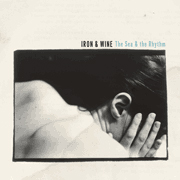Iron & Wine: The Sea and the Rhythm EP

[Sub Pop; 2003]
Rating: 8.4
It struck everyone as a little weird that Sub Pop would be the one to issue Sam Beam's hushed folk debut. From a distance, Beam's lo-fi compositions sounded like a Harry Smith field recording plucked away by Nick Drake with Crosby, Stills & Nash on backup. But close up it was all about the poetry: concrete, ambiguous, and laced with tender irony. Since Beam compares himself to J.J. Cale, and I'd even compare his lyrical style to Beck's Apollinaire-grade symbolism on Mutations, maybe it's not so weird that he's on Nirvana's label after all.
"I think I work with the visual a lot when I write," the part-time musician and full-time Miami film teacher once said. And The Creek Drank the Cradle was unabashedly concrete, studded with disarming pick-up lines like, "The water's there to warm you/ And the earth is warmer/ When you laugh," and, "Needlework and seedlings/ In the way you're walking." Its songs also sank into little moments still warm with loss -- small enough to get inside you, but general enough to fill you with an after-the-fact numbness recognizable as love. Mothers lost sons, daughters lost fathers, lovers lost love, and each song somehow contained a bit of each.
Strikingly, the singers on The Creek Drank the Cradle keep losing their religion, too: outgrowing the bonds of belief, losing their fear of the Lord, letting their mothers' bibles burn. One of them even looks back to see a long-extinct love as a kind of unrecoverable faith: "Found your rosary broken to pieces/ Every night by the bed you'd kiss the beads." Still, the crucifixion is the greatest myth of loss we have, and it's no shock that a lyricist soaked in southern allegory should adapt it for his own purposes. There's even a defiantly un-Christian ring to resurrection one-liners like, "Frozen, the ground refused to die/ And the guitar rose again."
But while the textures, tempos, and diction of the five short songs on The Sea & The Rhythm EP are consistent with what Iron & Wine has been -- and probably will always be -- the theme of loss has itself gone. In its place, Beam pushes trembling expectation, ecstatic abandon, and plain-faced repentance. Now, not one of these faded songs screams old-time religion, but it seems fair to wonder if there is a little revival going on here. "Beneath the Balcony" is a loping folk ballad telling the grim story of a warrior reduced to begging while some kids wait out a storm and "make sure the king won't grant the dead man one more day." At this point, it's an ambiguous parable with a crypto-Christian vibe worthy of C.S. Lewis. But when the Mother Mary appears begging with Christ on her lap, there's no question we're dealing with a gospel story. The song ends with a kid crouched behind a garbage can "who waits for the king to come/ And holds his sweating hand." Salvation, anyone?
The super-sweet title track, a hymn to sensual connection, is driven by its rare present-tense setting, but still sags. It draws its force from an ambiguity (is the "we" here lover/lover or mother/infant?) all a little too cheaply bought by come-ons like, "The milk from your breast is on my lips." Maybe the singer gets off by playing baby Jesus with grown women. Or maybe I just had to get a Jesus reference in for every song. At least I won't have to try for the last two.
The next track is a parable of sin and redemption masquerading as a nursery rhyme. Some Mexican kid -- called, you guessed it, Jesus -- was born in a truck on the fourth of July. A mobile manger for an American nativity scene. With fireworks blooming above like a star in the East, this selfless little immigrant gives the singer the best playing card in his grubby little deck. Such a pure act opens a space for Beam's trademark muffled irony, the kind of brutal understatement common on the LP but up to now absent on this EP: "He never wanted nothing I remember/ Maybe a broken bottle if I had two." Jesus covers for the singer, lets him break a five-dollar bet, and generally assumes his sins. Then, in an oddly specific twist, when the singer succumbs to temptation by secretly eloping to Vegas with Jesus' sister, the beatific child-god is there to greet them: "Naked, the Judas in me/ Fell by the tracks but he lifted me high/ Kissing my head like a brother and never asking why." Unmistakably salvific.
The last track goes down easy but is extremely hard to digest. "Someday the Waves" opens with a man waking at dawn to look down on his lover's face in wonder. The chorus seems like a sober display of faithfulness ("You pick a place that's where I'll be") until some cryptic and perverse forbearance slips in, Matthew-style: "Time, like your cheek, has turned for me." This could mean a number of things: the singer is marking time by his sleeping lover's tossing and turning; the lover's pallid complexion means the singer is running out of time; or, as the lover has patiently taken a beating, the singer has simply gotten older. The next verse promises a pie-in-the-sky day of redemption when "every aching old machine will feel no pain," but neglects to follow through with a credible image of relief.
It's the last verse that adds an oddly appropriate twist: "Waking before you I'm like the Lord/ Who sees his love though we don't know." Sure, it's a simile, but if you think about it, Sam Beam would make a great Holy Spirit. With a full-length album out by next Easter, he's got this Jew's vote for American Jesus in 2004.